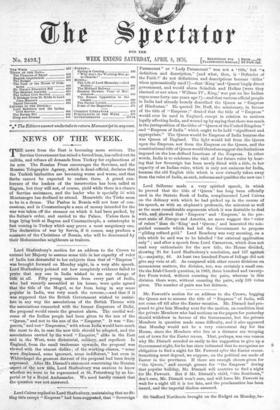Paramount" or "Lady Paramount" was not a title,' but "a
definition and description," [and what, then, is Defender of the Faith ?' do not definitions and descriptions become ' titles ' when systematically used ?]—that 'King' and Queen' i mply direct government, and would alarm Scindiah and Holkar [were they alarmed or not when William IV., King,' was put on the Indian rupee some forty-one years ago fl—and that various official people in India had already loosely described the Queen as "Empress of Hindostan." He quoted Dr. Duff, the missionary, in favour of the title of "Empress ;" denied that the title of " Empress " would ever be used in England, except in relation to matters legally affecting India, and wound up by saying that there was much in the juxtaposition of the titles of" Queen of the United Kingdom" and "Empress of India" which ought to be held "significant and appropriate." The Queen would be Empress of India because she was Queen of England. The light would fall from the Queen upon the Empress, not from the Empress on the Queen, and the constitutional title of Queen would therefore suggest the limitations imposed on the less-defined functions of the Empress. In other words, India is to celebrate the visit of her future ruler by hear- ing that her Sovereign has been newly fitted with a title, in her capacity of an Indian ruler, which is only not ominous for India, because the old English title which is now virtually taken away from the ruler of India, as such, redeems and qualifies the new one !


































